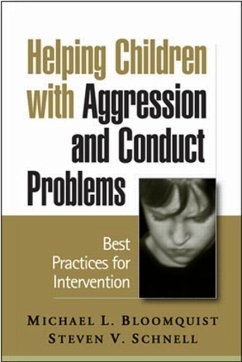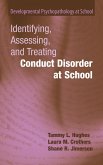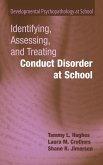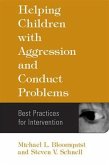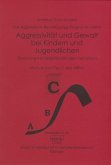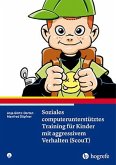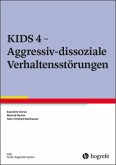This eminently practical book thoroughly describes the most effective interventions for 3- to 12-year-olds with aggression and conduct problems. Risk and protective factors for the development of these types of behaviors are explained and guidelines provided for planning and implementing such interventions as social competence training, parent and family skills building, psychotherapy, pharmacotherapy, school-based approaches, and community-based child and family support. Chapters on each type of intervention provide a concise review of the research literature, identify empirically supported program models, and offer clear recommendations for handling different clinical situations.
Hinweis: Dieser Artikel kann nur an eine deutsche Lieferadresse ausgeliefert werden.
Hinweis: Dieser Artikel kann nur an eine deutsche Lieferadresse ausgeliefert werden.
This very user-friendly volume provides a superb, up-to-date overview of the research base and clinical procedures for intervening with childhood aggression and conduct problems. It will serve as an excellent resource for professionals working in mental health, social welfare, and school settings. Moreover, use of this volume in graduate programs in social work, psychology, counseling, and education will make an important contribution to educating the next generation of professionals in the use of evidence-based best practices.--Scott W. Henggeler, PhD, Department of Psychiatry and Behavioral Sciences, Medical University of South Carolina
Two of the key strengths of this book are the text's provision of the best discussion at this time of the range of empirically supported interventions [and its] innovative and creative effort to abstract common content elements from empirically supported intervention programs....Bloomquist and Schnell have approached this task in a highly systematic and thoughtful manner, and the result is outstanding.--from the Foreword by John E. Lochman, PhD, The University of Alabama
This is the most comprehensive text I have seen on assessment and treatment of children with antisocial behavior. It is a 'must' for every graduate student, clinician, scholar, and program leader. Not only is the book scholarly, it is also practical. It provides the details of a range of empirically demonstrated interventions, from those that are individually focused to those targeting schools and families. In addition, strategies for coordinating interventions are reviewed in detail.--Thomas J. Dishion, PhD, Department of Psychology, University of Oregon
This book is extraordinary in its coverage of the problems associated with children's aggressive behavior. The authors' ecological focus is very important as they offer assessment and intervention advice across multiple settings and the multiple relationships that touch a troubled child. Of particular significance, as well, is their thematic focus on resilience and normal development. This information will provide readers with positive targets when designing treatment programs. This is a wonderful new addition to the libraries of teachers, counselors, psychologists, and physicians--in short, anyone who wants to be more effective with this population of children and youth.--Jane Close Conoley, PhD, College of Education, Texas A&M University
-Provides a thorough and up to date overview of best practice in assessment and intervention for children with aggression and conduct problems up to age 12....The book is grounded in empirical research, well organized with good use of summary tables and examples of assessment tools and clinical handouts, and provides a highly readable, lucid account.--Clinical Child Psychology and Psychiatry, 8/20/2005Æ'Æ'As an educator, researcher, and therapist, I found the book to be worthwhile reading, and it will remain an important reference book in my library....It is refreshing to read how other scholars and practitioners are also working with these children and facing similar dilemmas.--Social Work Today, 8/20/2005
Two of the key strengths of this book are the text's provision of the best discussion at this time of the range of empirically supported interventions [and its] innovative and creative effort to abstract common content elements from empirically supported intervention programs....Bloomquist and Schnell have approached this task in a highly systematic and thoughtful manner, and the result is outstanding.--from the Foreword by John E. Lochman, PhD, The University of Alabama
This is the most comprehensive text I have seen on assessment and treatment of children with antisocial behavior. It is a 'must' for every graduate student, clinician, scholar, and program leader. Not only is the book scholarly, it is also practical. It provides the details of a range of empirically demonstrated interventions, from those that are individually focused to those targeting schools and families. In addition, strategies for coordinating interventions are reviewed in detail.--Thomas J. Dishion, PhD, Department of Psychology, University of Oregon
This book is extraordinary in its coverage of the problems associated with children's aggressive behavior. The authors' ecological focus is very important as they offer assessment and intervention advice across multiple settings and the multiple relationships that touch a troubled child. Of particular significance, as well, is their thematic focus on resilience and normal development. This information will provide readers with positive targets when designing treatment programs. This is a wonderful new addition to the libraries of teachers, counselors, psychologists, and physicians--in short, anyone who wants to be more effective with this population of children and youth.--Jane Close Conoley, PhD, College of Education, Texas A&M University
-Provides a thorough and up to date overview of best practice in assessment and intervention for children with aggression and conduct problems up to age 12....The book is grounded in empirical research, well organized with good use of summary tables and examples of assessment tools and clinical handouts, and provides a highly readable, lucid account.--Clinical Child Psychology and Psychiatry, 8/20/2005Æ'Æ'As an educator, researcher, and therapist, I found the book to be worthwhile reading, and it will remain an important reference book in my library....It is refreshing to read how other scholars and practitioners are also working with these children and facing similar dilemmas.--Social Work Today, 8/20/2005

